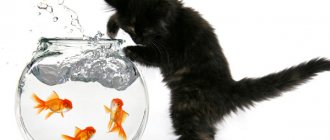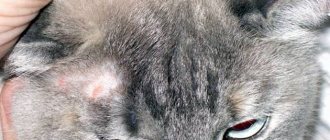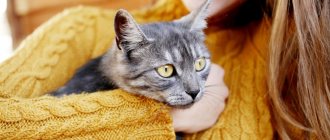The question of whether cats can be given fish - both raw and boiled - many owners of mustachioed and tailed cats do not ask themselves: they simply pamper their pets with mackerel, blue whiting, sprat, even herring, if at the very sight of it the pet begins to meow heart-rendingly, demanding to share . However, we should not forget that most allergic reactions, which are so difficult to get rid of, are caused by natural food in one form or another. In this article we will try to figure out: is it possible to give an animal an endless Thursday or not?
photo from website: pinterest.com
Why cats should be given fish: arguments from owners
Why not? After all, he/she needs it - for health, for shiny fur, in the end, because it has always been like this - from time immemorial! This is the thinking of most owners who succumb to the complaints of their four-legged friends and pamper them with “delicious food”. For them, the benefits of this product are indisputable - after all, it contains Omega-3 and Omega-6 - fatty acids that have an extremely beneficial effect on the body - they prevent the development of many diseases, make the coat glossy and thick, and have an anti-inflammatory effect.
Here are a few more arguments from owners who prefer “natural” to “drying” - river, sea, raw and boiled, smoked and salted:
- Cats have always eaten fish.
This argument can be heard in all disputes devoted to the proper nutrition of our little brothers. They say that for many millennia such fearless hunters took their inhabitants from ponds, rivers and lakes, and then ate them. This proves the attachment of four-legged pets to pike, perch, capelin, whiting. However, in declaring this, we forget that it was man who got the cat addicted to fish. The distant ancestors of our pets were their African wild counterparts. They were even afraid to approach the water, let alone put their paws in it. But they hunted rodents and larger animals with great pleasure. It turns out that a mouse is a more natural food for a domestic cat than the same fish.
photo from website: wallpapersafari.com
- In the villages, all the cats ate fish and did not complain.
Of course, they only lived much less than the city dwellers. Often it was the diet, which included everything that fell from the owner, that became and continues to become the cause of illness and death of village animals. Do you want your cat to suffer the same fate?
- I had a friend whose Fluff/Barsik/Vaska ate fish all the time and lived a long time.
What significance can an example with some Barsik or Vaska have if the body of each pet is individual? Some people have excellent health, while others experience allergy attacks every time the owner feeds them perch or burbot freshly caught from the river. Do not transfer other people's experiences to your pets. Remember: what is a delicacy for one can become real poison for another.
- What about healthy fish oil?
It can be completely replaced by including special additives in the cat’s diet, which we will discuss at the end of the article.
As you can see, all the myths have been destroyed, and the question of whether it is possible to feed a cat raw and boiled fish every day should no longer arise for a caring owner. However, one explanation is not enough; irrefutable evidence of harm is also necessary. After all, if in front of the owner the animal does not feel sick from what he eats, he is unlikely to take a completely different position after hearing arguments against it.
So, let us repeat once again: you cannot overfeed your pet with what you brought from the store or caught in the nearest pond, and this is a fact. Why? We will talk about this in detail below.
Who are fishing cats?
Fishing cat (Prionailurus viverrinus) literally translated as “fishing cat” is a very real, albeit very rare, representative of the cat family.
The animal lives in East Asia. Fishing cats live in flat and marshy areas near ponds, rivers and streams. These animals are absolutely silent when hunting and are excellent swimmers and divers. Fishing cats lead a solitary, nocturnal and very secretive lifestyle, so seeing them is a great success.
This is interesting! Fishing cats are a national treasure of West Bengal.
Fishing cats have coarse, waterproof fur, an ashy striped color and relatively modest dimensions. Unfortunately, due to the artificial drainage of water bodies and “progress,” we risk seeing these beautiful animals only on the pages of the “book of the extinct.”
Why cats should not be given fish in large quantities
photo from the site: thecatsite.com
If you think that the animal’s stomach will easily digest what you put in its bowl by carefully removing the bones or mashing them - when boiling blue whiting or pollock - you are mistaken. Our pets digest this kind of food with great difficulty. And the body of a domesticated animal is not adapted to the composition of fish. Here's an example: the majority of seals fed by their owners to a diet of river and sea creatures develop urolithiasis (UCD).
The fact that a pet enthusiastically devours boiled or fried carp, silver carp or gudgeon does not mean that such food will be good for it. The consequences of monotonous and improper feeding are as follows:
- Fish contains a large amount of salts. They affect the functioning of the kidneys - over time, an important organ fails, and you have to take the animal to the veterinarian to begin treatment. Neutered cats are most susceptible to the harmful effects of salt. And magnesium and phosphorus become the very building materials on which stones are formed.
photo from website: wallpaperist.com
- Can feeding fish worsen a cat's health? Certainly. Let's start with the fact that together with it you can introduce worms into your pet's body, which will then have to be expelled by carrying out mandatory deworming. Another horror story for owners that continues to be relevant to this day is opisthorchiasis. This is the name for prolonged helminthiasis, during which the liver, pancreas, and gall bladder are damaged. That's why cats can't eat raw fish - even if they insist on asking for it.
- If you feed your pet fish every day, be prepared for him to develop hypovitaminosis. The reason for its occurrence is the action of the enzyme thiaminase. It destroys vitamin B1, leads to impaired absorption of iron, and then to anemia. Due to prolonged feeding of natural and “natural” foods for cats, our four-legged friends suffer from a lack of vitamins E and K (necessary for normal blood clotting). As a result of disruption of the synthesis of the latter, any bleeding (even the slightest) can lead to a disappointing outcome.
Why can't cats be fed fish? After all, it contains iodine, which is so useful! Yes, but not in the quantities in which it enters the body of animals that consume this product every day. The consequence of the accumulation of an important element is the development of hyperthyroidism, and with it a dysfunction of the thyroid gland, the occurrence of heart and vascular diseases.
- And finally, one more argument: fish protein is a strong allergen. If you haven't noticed any unpleasant symptoms yet, you're in luck. However, those who have already taken their animal to the clinic and were forced to follow the treatment rules by putting the cat on a strict diet will no longer want to feed their pet only fish.
Here are just a few possible scenarios that could happen in reality if you don’t stop feeding your animal natural products that are harmful to it. And here are additional arguments that lovers of nutrition as close to natural as possible forget about.
Dry food
“on fish” - is it possible or not? Fish-based food goes through several stages of processing. At high temperatures, helminth larvae are destroyed in fish and harmful substances decompose. To be fair, beneficial substances also decompose during heat treatment. The next fact you need to know is that the basis of fish food is not the fish itself, but the flour from it. That is, carcasses are subjected to high temperatures and processed to a powder state, along with bones. After such a path... any product will lose almost all beneficial and harmful properties. To make the food healthy, in addition to fishmeal, vitamin complexes are added to it. Typically, “fish” food contains all fatty acids, this is their main difference from “meat” products.
Naturally, when we talk about industrial feed, we mean high-quality products of at least premium class. Recent studies have shown that high-quality dry food does not affect the risk of developing urolithiasis, provided that the cat consumes enough water. Another nuance that needs to be considered is medicinal feed. It just so happens that some of the expensive, medicinal foods are made from salmon. Caring owners make the mistake of feeding such products to healthy animals.
Feeding medicated food is intended for animals suffering from chronic illnesses or early stage diseases. If you feed a healthy cat medicated food for prevention, the result will be the opposite. Medicinal foods change the acidity of urine; if the cat is healthy, they disrupt it. It turns out that trying to prevent the development of urolithiasis in a pet, the owner only makes things worse. By the way, a sterilized cat or neutered cat does not need to be fed with preventative food.
Can cats eat fish with bones: sharp and dangerous?
photo from website: siberiantimes.com
Bones are the reason for many visits to the veterinarian:
- They can damage the larynx while the pet chews the meat.
- Passing through the esophagus, sharp fragments scratch its walls and provoke serious injuries and bleeding.
- Once in the animal's intestines, an acute foreign body leads to the onset of an inflammatory process, sepsis or perforation.
Such consequences are not just another exaggeration, but a warning for those who include exclusively pollock, blue whiting, and perch in their pet’s diet, and then complain about their pet: they don’t eat other food at all. Alas, our smaller brothers quickly get used to this menu and demand it again and again. They have no idea how dangerous their favorite treat is in large quantities.
Other opinions
Some sources say that giving bones to cats is not only possible, but also necessary. They justify this by the fact that in the wild their immediate relatives, when obtaining meat for themselves, eat it along with the bones. Thus, they saturate their body, sharpen their fangs and receive the missing vitamins and minerals. However, do not confuse predatory cats with domestic ones. Their body does not accept such a delicacy, and they have no need for it.
Is it possible to give a cat smoked, salted fish or river fish with bones?
photo from the site: cutecats.candra.info
The answer is: neither the first, nor the second, nor the third. And that's why:
- Smoked food is very difficult for our four-legged pets. Once in the animal's body, it has a detrimental effect on the liver. Carcinogens formed as a result of processing such fish lead to the development of tumors and destroy the gastric mucosa.
- If you want to offer your cat a piece of herring, think twice. The more salts in the product, the higher the risk of developing urolithiasis. Another danger that awaits tailed lovers of herring, salmon and pink salmon is opisthorchiasis, which we have already described above. So to the question, can cats eat salted fish? There is only one answer: no.
- Bones injure the larynx and esophagus with intestines. Previously, we examined in detail the dangers of skeletal parts entering the animal's body and were convinced that in the worst case, immediate surgical intervention may be required.
Some people manage to feed their cats raw fish without realizing why this should not be done. We remind you once again: a product that has not undergone heat treatment is rich in parasites - there is a high risk of helminthic infestation.
Another argument against is the high content of histamine, which enhances allergic reactions and can provoke a significant deterioration of the condition during serious inflammatory processes. So if you know that your animal is sensitive to all natural food, it is better to switch it to special dry food so as not to risk it.
Features of a cat's diet
Dry and canned cat food, of course, is more convenient for owners; they don’t have to think about the composition of the products, since the ready-made menu is already balanced and contains all the necessary nutrients. But it has already been proven that natural food is more natural and less harmful for cats. The main part of the cat's diet should be meat and meat products, in the total volume they should be at least 80%, the remaining 20% should be a variety of additives: dairy products, vegetables, vegetable oil, including fish. From this category of products, cats can only be given sea fish of fatty varieties; the bellies of salmon, salmon, and trout are perfect for this purpose. They contain a lot of vitamins E and D, which are necessary for a beautiful silky and shiny skin and a strong skeleton of the animal. You can also give deboned Pacific herring and mackerel.
The rare endogenous vitamin K contained in fish is synthesized in the cat’s body not from fish, but from other foods. Therefore, there is no need to give her fish as a source of this vitamin.
What kind of fish can you feed your cat and how often: what is best to give?
photo from website: goldfishcareinformation.com
Does this mean that the animal is not allowed to do absolutely anything? You should not think that one of his many joys has been lost for your pet - you can give tender boiled meat, but only in small quantities. Below we provide recommendations from veterinarians regarding everything caught or purchased on the market:
- River fish should not be given due to the high risk of injury to the pharynx and esophagus and helminthic infestation.
- You can feed sea creatures by first heat-treating them - by boiling and separating the meat from the skeleton, finely chopping it and adding it to porridge or mashed vegetables. Don't forget to remove all the bones. The best option would be to buy fillet. Such a delicacy is permissible extremely rarely - no more than a small portion once a week.
If you are afraid that in this situation your pet will be deprived of useful fish oil, buy special supplements or vitamin complexes designed specifically for tailed fidgets - for example, Nutricoat or Brewers Yeast. With them, all the necessary substances will enter the animal’s body, helping to maintain vigor and excellent health.
So, we figured out what kind of fish can be given to cats - sea fish, thoroughly boiled, lean, boneless and, preferably, fresh. And the basic rule has been repeated more than once: you cannot indulge your pet’s wishes every day - switching to an incorrect and monotonous diet can end in failure. The list of unpleasant consequences of feeding a cat capelin, halibut or a piece of salmon includes the development of urolithiasis, hypovitaminosis, hyperthyroidism, infection with worms, injuries to the esophagus and internal bleeding due to damage to the intestines by sharp bones. Be attentive to the health of your animal and do not offer it potentially dangerous products.
Danger
Bones crushed by an animal's teeth can damage the walls of internal organs or even puncture the stomach. In addition, the pet can simply choke on such food, and if it gets stuck in the teeth, it will create terrible discomfort.
Bones, even well crushed, are incredibly heavy food. They are poorly digestible and clog the stomach. Diseases such as intestinal blockage, obstruction and internal bleeding can be caused by just a “harmless” bone.
If you still want bones to be present in your pet’s diet, then be sure to listen to a few recommendations.
- Do not give your animals sharp, large or medium-sized tubular bones!
- Give preference only to the raw product, but in no case to the one that has undergone heat treatment!
- It is permissible to offer an animal only a carcass minced in a meat grinder containing suitable bones (spongy and soft), for example, chicken necks or tails.
What to do if a bone is stuck in your throat?
If a cat has a bone stuck in its throat, the most important thing is not to panic! Only quick and confident actions can help the sufferer.
The following symptoms will help you understand that a foreign object is bothering your animal:
- urge to vomit accompanied by hoarse sounds;
- Constantly open mouth and cough.
In this case, you need to act very quickly. The pet is picked up and brought to a source of bright light. The owner must open the cat's mouth and find the bone. You must try to carefully remove it from the throat with tweezers. If all your actions lead to nothing, and the bone was not removed, then you need to immediately go to the nearest veterinary clinic!
Did the animal choke?
If a cat chokes, it will be accompanied by the following symptoms:
- cough;
- current drool;
- trying to get something out of the mouth with a paw.
The first steps are the same as for a stuck bone. We are trying to locate and remove the bone. If it is not in the throat, then you need to act as follows. We sit on the floor. We place the animal facing us. We lift the cat's hind legs and clamp them with our knees. We place our hands on the sides of the chest and sharply squeeze it 4-5 times. This is necessary for the cat to cough up the foreign body.
You need to squeeze the chest sharply, but carefully, so as not to harm the animal! If the process is not successful, then we rush to the veterinarian!











